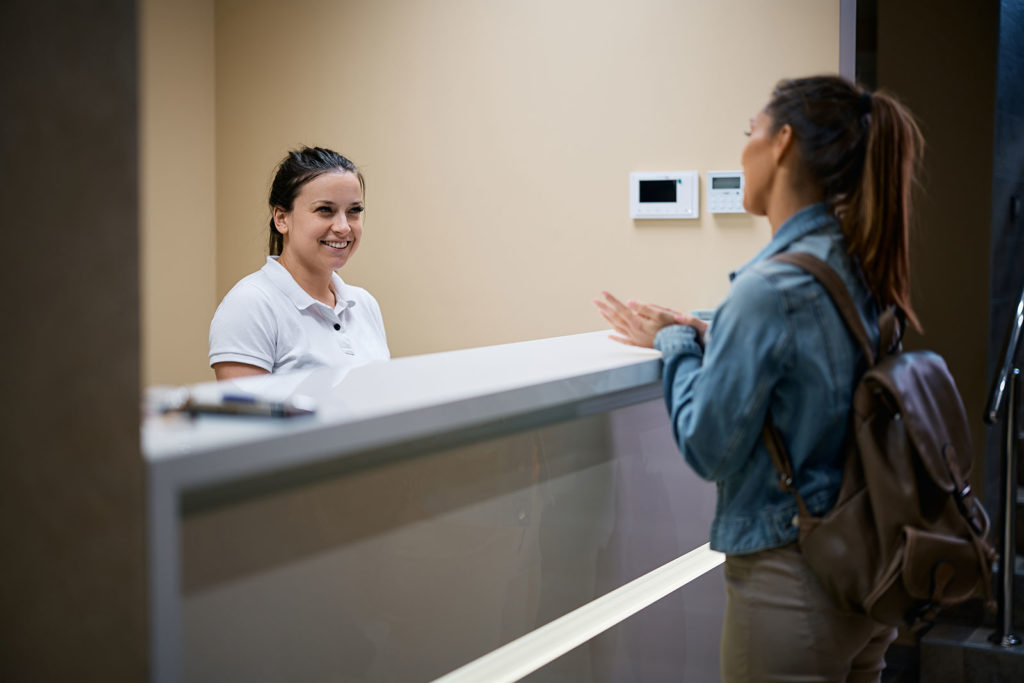Some people who seek mental health or addiction treatment need more help than traditional outpatient programs but less than what inpatient hospitalization provides. Two available treatment alternatives include partial hospitalization programs (PHPs) and intensive outpatient programs (IOPs). While these options each have more structure than regular outpatient treatment, they have important differences you need to know before choosing.
Illinois Recovery Center offers both partial hospitalization and intensive outpatient programs. This guide explains how these options differ and what you can expect from them when you are seeking addiction or mental health treatment.

Table of Contents
What is an Intensive Outpatient Program (IOP)?
Intensive outpatient programs (IOPs) offer greater flexibility than PHPs but provide structured support. IOPs are outpatient treatment programs for people who need more structure than traditional outpatient therapy without the day-long commitment required by partial hospitalization programs.
IOPs are structured programs that deliver individual and group therapy several times each week for those who have substance abuse or mental health disorders. Most IOPs require people to attend group or individual therapy sessions three to five days per week for three to four hours for a total of 12 to 15 hours of treatment per week.
An IOP is designed for individuals moving down from a higher level of care, such as PHPs or inpatient treatment, and those who have achieved enough stability to manage their conditions outside of hospitals. IOPs are flexible enough for people to live at home, attend school, or work while receiving intensive treatment.
IOPs provide tailored services, including:
- Group therapy to allow individuals to share and learn from others
- Individual therapy to help individuals address the root causes of their issues
- Relapse prevention to help individuals identify triggers and learn strategies to maintain recovery
The duration of an IOP will depend on the individual’s needs and progress and can range from several weeks to a few months. An IOP’s duration will be tailored to help an individual transition back into regular life while receiving continuous support for their issues.
IOPs are commonly used to help people recovering from substance use and disorders, including addictions to opioids, cocaine, alcohol, prescription drugs, and others. For those struggling with substance use disorders, therapy will focus on helping individuals identify triggers and develop coping skills while building healthy habits to help them maintain sobriety.
People suffering from mental health conditions such as anxiety, depression, post-traumatic stress disorder (PTSD), and others can also benefit from IOPs. These programs are flexible enough to help them get the treatment and ongoing support they need for their mental health conditions while still living at home, working, or attending school.

What is a Partial Hospitalization Program (PHP)?
A partial hospitalization program (PHP) provides a higher level of care than an IOP and is commonly used as a step-down from inpatient care. Like an IOP, it is provided on an outpatient basis but requires more time each day. A PHP provides more structure and support than an IOP or traditional outpatient treatment. It allows people to receive treatment during the day but return home each night.
People in PHP treatment typically attend daily sessions five to seven days per week that last from four to six hours. A program must provide at least 25 hours per week of treatment to be a PHP. The program provides individuals with structured support to work on recovery and includes:
- Individual counseling to focus on the individual’s challenges and goals
- Group therapy to allow individuals to share experiences with others in recovery with the help of a therapist
- Medication management to help individuals manage symptoms with professional monitoring
- Cognitive-behavioral therapy (CBT) to help individuals change distorted thinking patterns
- Dialectical-behavior therapy (DBT) to help individuals improve relationships and manage emotions
- Family therapy to help individuals repair and improve relationships for a stronger support system
- Wellness programs such as mindfulness, art therapy, and meditation for a holistic therapeutic approach
PHPs are suitable for those dealing with severe substance use or complex mental health disorders to learn how to manage symptoms effectively while becoming healthier.
They vary in duration based on an individual’s needs but typically last several weeks to a few months. The program’s length is designed to allow individuals enough time to build recovery skills while deeply engaging in treatment.
A PHP might be used for those dealing with complex mental health conditions, including depression, anxiety, PTSD, bipolar disorder, and others. It is also beneficial for those with severe substance use disorders who need a higher level of care than what an IOP or traditional outpatient program provides but who don’t need supervision 24 hours per day. Finally, PHPs are suitable for those with dual diagnoses of mental health and substance use disorders.

Key Differences Between IOP and PHP
The way that IOPs and PHPs deliver treatment differs. You must understand how these programs differ to make an appropriate choice.
Structure and Level of Care
While both IOPs and PHPs offer structured treatment, PHPs are more highly structured and less flexible than IOPs. A PHP emphasizes a combination of psychiatric and medical treatment, including individual and group therapy, talk therapies, family therapy, and medication management.
An IOP is more flexible in treatment delivery and allows participants to work or attend school. The program might include individual and group therapy with sessions to help individuals build skills, but it will have less oversight from medical professionals.
Time Commitment
A PHP requires participants to spend a minimum of 25 hours each week in treatment, which means they will spend a large part of each day attending the program. An IOP is more flexible and requires less time. Someone participating in an IOP will attend sessions from three to four hours per day for 12 to 15 hours per week.
Program Duration
A PHP’s duration will vary based on the individual’s needs and goals but typically lasts several weeks to a few months. An IOP’s duration will also vary based on the participant’s needs and typically lasts from a couple of weeks to months. Individuals in a PHP attend five to seven days per week for four to six hours per day. Those in an IOP attend three to five days for two to four hours weekly.
Suitability for an Individual’s Recovery Stage
Individuals stepping down from inpatient treatment or residential care and those who need more treatment intensity and medical supervision might choose a PHP. This program offers more structure and intensity than an IOP and is a good option for those with severe addictions, complex mental health conditions, or dual diagnoses.
People ready to step down their level of care while transitioning back into their everyday lives while living at home, working, or attending school might opt for an IOP. This program is more flexible and designed for those who have already completed a higher level of care and don’t require as much structure as a PHP provides.

Choosing the Right Program
Numerous studies have demonstrated that IOPs are effective for those recovering from substance use disorders or dealing with mental health conditions. For example, a 2014 study published in the journal Psychiatric Services found that IOPs were just as effective as inpatient and residential treatment for those suffering from substance use disorders. Another study found that partial hospitalization programs for alcohol use disorder were just as effective as long-term inpatient treatment but that the subjective wellbeing of participants was higher and the costs were lower.
While both approaches are effective, it can be difficult to figure out which approach is appropriate for you or your loved one. How effective a program will be depends on the individual’s circumstances and needs and the treatment approach. Consider the following factors when making your decision:
Whether Mental Health Support is Needed
If you or your loved one has a complex mental health condition or a dual diagnosis of a mental health condition and a substance use disorder, a PHP might be the better option because of the highly structured treatment and its intensity. For those who need greater flexibility and are not struggling with a dual diagnosis or a complex mental health condition but who need more treatment than regular outpatient for substance use disorder, an IOP might be the right choice.
Amount of Structure
An IOP is a good fit for those who require less support and structure because it allows them to remain in school or continue working while receiving treatment. A PHP might be the right option for those who need a higher level of care but don’t require 24-hour supervision. A PHP is more highly structured than an IOP.
Family Support
People who have a good support structure at home can do well with an IOP as long as they can independently follow through with their treatment recommendations. Those who do not have a lot of support outside of the treatment setting might be better off with a PHP because of the opportunities to benefit from peer support and social interaction.
Cost
PHP programs are more expensive than IOPs because of the supervision and level of support provided. If you choose a PHP, you’ll need more insurance coverage or pay higher out-of-pocket costs than an IOP. An IOP may be more affordable and covered by insurance, which can be beneficial for those who need treatment but can’t afford the expense of a PHP or full-time residential care.

Illinois Recovery Center’s Approach to IOP and PHP
Illinois Recovery Center provides both a Partial Hospitalization Program (PHP) and an Intensive Outpatient Program (IOP) tailored to an individual’s specific needs. As a premier treatment facility, we offer comprehensive treatment options to support individuals on their recovery journey.
The PHP is designed for those who require a higher level of care and a significant amount of support and treatment sessions. Participants benefit from intensive treatment each day while living at home or in a residential program, such as sober living. This includes group therapy sessions, individual therapy, and family therapy. We take a holistic therapeutic approach to help people overcome challenges such as drug addiction and mental health concerns, utilizing multiple evidence-based treatments like medication management and talk therapies.
The IOP is designed for individuals who need more flexibility in their treatment and have a strong support network at home. This program is ideal for those who wish to continue working or attending school while living at home. The IOP includes individual therapy and group therapy sessions to help clients achieve their goals, develop coping skills, and reinforce them in everyday life. It also incorporates life skills and relapse prevention techniques to support long-term recovery.
Get Help at Illinois Recovery Center
If you or a loved one needs a treatment center offering a higher level of care than regular outpatient treatment, consider a PHP or IOP treatment at Illinois Recovery Center. Our caring professionals are here to guide you through your treatment options and help you decide which program best suits your needs. Call us today for a confidential consultation and take the first step on your recovery journey.



